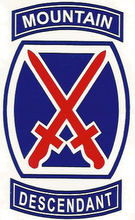From the book "In my father's foxholes and footsteps"
- From the book "In my father's foxholes and footsteps"
- The arrival in Italy and the transfer to the Apennines
- The attack on Mt Belvedere
- The defence of Mt Belvedere
- Il Malandrone, Cimon della Piella and Pietracolora
- The conquest of Castel d'Aiano and Mt della Spe
- The Spring Offensive
- Tolè towards Monte Pastore
- The conquest and crossing Savigno
- Fly down into the Po Valley
- Crossing the Po river
- The end of the war in Italy
- Return back to America and to the family
- All Pages
The plan of attack at Mt. Belvedere was communicated just a few days before. The information was first given to the Officers then to the Sergeants. According to the plans, on the night of February 18, 1945, Riva Ridge, which was to our left, was to be taken. The plan was to eliminate the German observation deck located there so that those scheduled to arrive the next day or next evening would be free from German artillery fire. The assault by the 86th Battalion was successful. On February 19, the 85th Regiment was in the center of a scrimmage, under the slope on Mt. Belvedere, while the other two Battalions of the 86th Regiment were to the far right. I was in the 3rd Battalion of the 87th . We had arrived at Vindication and Lozano, around 7 pm, to rest for the evening. We had arrived shortly after the other two Battalions had departed; they were on their way to attack the German lines at Mt. Belvedere. This was during the night of February 19-20, 1945. I will always remember that name, Vidiciatico, it is there we heard fighting throughout the night. The line of departure was to be near a small village called Querciola.
When you cross the line of departure time stops, you know. I remember that night; we were told at 11 pm that the 86th Regiment took control of Riva Ridge. Of course we were all very happy that they didn’t suffer as many casualties as expected. It was a surprise attack for the Germans they were probably asleep. I imagine they never expected a night attack; a morning attack after artillery preparation was the usual thing to do. I can look back now and understand why a night attack was better. It would have cost us many lives if it had happened during the day.
On the departure line of Querciola, the two 87th Battalions were to attack Corona. One was to go left and down towards the villages of Polla and RoccaCornetta. The other Battalion, after passing Corona, was to climb to the west side to the summit of Mt. Belvedere. This was also the objective of 85th Regiment who were to the right of us. Both regiments encountered heavy artillery fire. There were many casualties due to mines and traps left behind. It was thought that the road had been cleared, but it wasn’t until the following day when tanks and trucks start blowing up we realized it wasn’t. In any case the war went on and we took the mountain. The next morning Mt. Belvedere, Corona and all the surrounding areas had been seized. The 3rd Battalion was now in reserve in Vidiciatico.
On January 19, around noontime, we were told that we were going to relieve the troops at Corona. I think it was B Company that had taken Corona but then they had left and gone up Mt. Belvedere. There were still a few German snipers left at Corona that needed to be eliminated. It was about 2 pm when we left for Corona. We were met with a lot shelling, many of which were close hits. Once we arrived at Corona we took our positions. Later on that afternoon we set up our mortars. For a long time it was quite. Our company was spread throughout foxholes down the left side of Corona. During this time we wanted to secure the tanks and other heavy equipment because we expected a counterattack the following morning.
Usually two men were stationed in a foxhole, one would stay awake while the other, if at all possible, would try to take nap. I don’t think any of us slept that first night. That night we were three in a foxhole, one of the fellows was married with two children; he was from the mountains of Tennessee or thereabout. I remember when the German artillery began to fire and the shells fell down all around us, oh my, how he would begin to tremble he wouldn’t stop. He couldn’t control himself making me very nervous. I would have rather preferred another fellow who also an assistant gunner, like Coleman who was from Iowa. To this day I still call him my “foxhole buddy” because we fought the entire war together, from Kiska to Italy. He was perfect, not married and could deal with it.Going back a little bit, I remember when we arrived at Pisa. One of the fellows had to be evacuated and taken out and brought back to the United States because of his insomnia. He broke down and was discharged.








